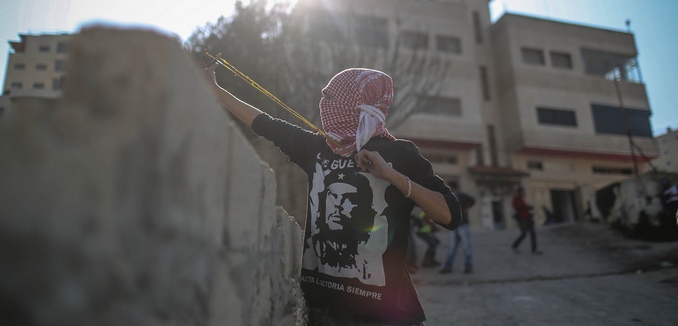The banner hanging in the mourners’ tent at the Jaradat home, in the Hebron-area village of Sa’ir, said it all. On one side appeared Yasser Arafat in military garb, and on the other, Arafat Jaradat, the 30-year-old Palestinian prisoner who died this weekend while being detained in Israel.
Scrawled under the photo of the less-famous Arafat: “Arafat Jaradat, who died a martyr’s death due to torture at the hands of the Prison Service.”
The banner was, naturally, written up hours before Jaradat’s autopsy, in which Israeli doctors linked the death to a heart attack while a Palestinian doctor, brought in by the Israelis to enhance transparency, insisted that the detainee had died as a result of torture and blunt force. Not that the autopsy’s results would have mattered – out here family and friends, Fatah supporters and those of Hamas, all agree that Jaradat was assassinated by the Zionists.
No one in Sa’ir was waiting for the autopsy results from Tel Aviv. Dozens of youths fanned out into to the main road and began hurling stones at Israeli vehicles. The stone-throwing continued into the weekend, when Israeli soldiers were able to push the clashes into the village itself. Inside the village, an unusually large mourners’ tent was erected, and hundreds of colorful plastic chairs were set up to accommodate the men who streamed in from all over the West Bank to offer condolences.
Fatah songs played in the background, and the movement’s flags waved all over the stage. A few Islamic Jihad representatives tried to hang their group’s flag onstage. They were rebuffed by the Fatah operatives who had organized the event.
The press also streamed in, realizing the potential for Jaradat’s death to lead to another bloody escalation between Israel and the Palestinians.
The women in the Jaradat home received the well-wishers. More than 100 women crammed into the home’s courtyard and rooms in the afternoon hours. Inside sat his widow Dalal and mother Umm Mahmoud with the dead man’s children and other relatives. Journalists packed the room, including from the Hamas-run television channel Al-Quds. During the live broadcast the journalist asked Jaradat’s mother about how the Shin Bet agent who had detained him had made sure to bring him home so he could “part from his children one last time.”
The blaring music was lowered as the Al Jazeera correspondent filmed from the stage, intoning, “Arafat Jaradat is the 203rd prisoner to die in an Israeli prison as a result of torture and medical malpractice.” After a few takes, the music was returned to full blast.
Village resident and Fatah leader Abbas Zaki then arrived at the tent. It’s a badly kept secret that Zaki has recently been removed from the movement’s upper echelon. Perhaps that’s why he allowed himself to be unusually critical of the Palestinian Authority and its president Mahmoud Abbas.
“The people will decide whether we’re about to embark on an intifada. The current leadership cannot calm tempers – the economy is ruined; Jerusalem is under attack. The president [Abbas] says he opposes an intifada and armed struggle, but is he able to convince his people of that? No, he won’t be able to bring his people anything. Is there any Palestinian leader who can say we’ll overlook the spilled blood of Arafat Jaradat? It’s the PA that should be revolting – we’re all ready to fight and even to die.”
And outside…
Speculation has been rife in recent days, both among Israelis and Palestnians, over the possibility of an impending third Intifada.
The clashes have until now failed to sweep up the whole Palestinian public, unlike in the first days of the first and second Intifadas. Even elements inside the Palestinian security services are loath to raise tensions with their Israeli counterparts. Last Friday, for example, a group of some twenty Palestinian police officers sought to disperse stone throwers who had gathered in Hebron’s so-called Policeman’s Square. Pummeled by stones, the cops fled.
Less than an hour later, the policemen were back in the square, this time bolstered by dozens of their Israeli counterparts. The Israelis fired a number of tear gas grenades, dispersing the protesters and allowing the policeman to reassert control.
Was this an instance of Palestinian-Israeli cooperation? It’s hard to say.
What’s undeniably clear is that the Palestinian security forces are serving as a buffer against a dangerous outburst of violence, even as their counterparts in Fatah continue to ratchet up the rhetoric of confrontation.
It’s a dangerous game on the Palestinian Authority’s part. The PA’s top leaders have declared that they’re firmly against violence, and yet the heads of Fatah – and also, in large part, those of the PA – scarcely conceal their support for violent protests (though they of course don’t describe them as such) as long as they don’t spread beyond the fully Palestinian-controlled parts of the West Bank known as Area A.
The stakes for Fatah could not be higher, and there are already signs that they are losing control.
[Photo: The Israel Project / Flickr]




